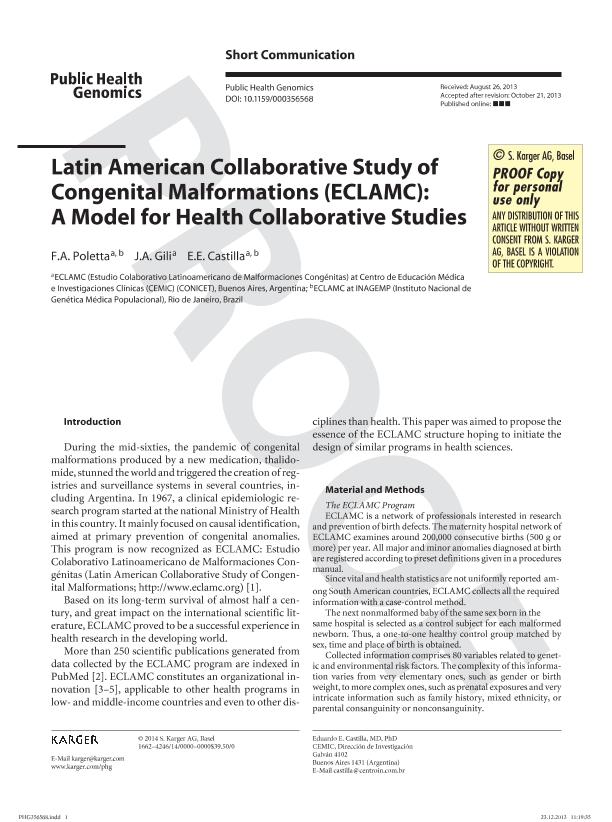Mostrar el registro sencillo del ítem
dc.contributor.author
Poletta, Fernando Adrián

dc.contributor.author
Gili, Juan Antonio

dc.contributor.author
Castilla, Eduardo Enrique

dc.date.available
2018-01-15T20:59:44Z
dc.date.issued
2014-01
dc.identifier.citation
Gili, Juan Antonio; Castilla, Eduardo Enrique; Poletta, Fernando Adrián; Latin American Collaborative Study of Congenital Malformations (ECLAMC): a model for health collaborative studies; Karger; Public Health Genomics; 17; 2; 1-2014; 61-67
dc.identifier.issn
1662-4246
dc.identifier.uri
http://hdl.handle.net/11336/33364
dc.description.abstract
BACKGROUND: For the past 46 years, the Latin American Collaborative Study of Congenital Malformations (ECLAMC) has successfully dealt with a low-priority health problem in the region, using installed capacity and low technological complexity, aimed at research rather than health information and action. Originally planned for a city, but rapidly expanded to whole South America and beyond, involving more than 200 hospitals from 12 Latin American countries: Argentina, Bolivia, Brazil, Chile, Colombia, Costa Rica, Dominican Republic, Ecuador, Paraguay, Peru, Uruguay, and Venezuela. In the present study, the ECLAMC structure is shown as a social network with the aim to facilitate its transfer.
METHODS: Data from 261 hospitals from 12 countries that have participated in the ECLAMC program during 1967-2012 were included in this work. Three types of data were evaluated for network analysis: data collection, participation in special research projects, and co-authorships. Indicators as total size (number of nodes), path count, density, degree centrality, closeness centrality, and betweenness centrality were estimated to compare the structural characteristics and attributes of the networks.
RESULTS: The ECLAMC networks can be defined, from the social network analysis point of view, as a centralized, unimodal, afferent network for data collection; as a decentralized, bimodal, interactive network for special projects; and co-authorship of published papers. Conclusions: The key elements in the ECLAMC program are: collaboration between motivated expert people, voluntarily accepting the same research protocol, with a sense of belonging to the working-team, based on mutual trustfulness within a transparent framework, with explicit rules, aimed at producing data of internationally competitive quality. This example is proposed for future health programs, mainly in low- and middle-income areas.
dc.format
application/pdf
dc.language.iso
eng
dc.publisher
Karger

dc.rights
info:eu-repo/semantics/openAccess
dc.rights.uri
https://creativecommons.org/licenses/by-nc-sa/2.5/ar/
dc.subject
Birth Defects
dc.subject
Congenital Diseases
dc.subject
Developing Countries
dc.subject
Epidemiology Surveillance
dc.subject.classification
Salud Ocupacional

dc.subject.classification
Ciencias de la Salud

dc.subject.classification
CIENCIAS MÉDICAS Y DE LA SALUD

dc.title
Latin American Collaborative Study of Congenital Malformations (ECLAMC): a model for health collaborative studies
dc.type
info:eu-repo/semantics/article
dc.type
info:ar-repo/semantics/artículo
dc.type
info:eu-repo/semantics/publishedVersion
dc.date.updated
2018-01-08T19:49:06Z
dc.identifier.eissn
1662-8063
dc.journal.volume
17
dc.journal.number
2
dc.journal.pagination
61-67
dc.journal.pais
Suiza

dc.journal.ciudad
Basilea
dc.description.fil
Fil: Poletta, Fernando Adrián. Consejo Nacional de Investigaciones Científicas y Técnicas. Oficina de Coordinación Administrativa Parque Centenario. CEMIC-CONICET. Centro de Educaciones Médicas e Investigaciones Clínicas ; Argentina. Instituto Nacional de Genética Médica Populacional; Brasil
dc.description.fil
Fil: Gili, Juan Antonio. Consejo Nacional de Investigaciones Científicas y Técnicas. Oficina de Coordinación Administrativa Parque Centenario. CEMIC-CONICET. Centro de Educaciones Médicas e Investigaciones Clínicas ; Argentina
dc.description.fil
Fil: Castilla, Eduardo Enrique. Consejo Nacional de Investigaciones Científicas y Técnicas. Oficina de Coordinación Administrativa Parque Centenario. CEMIC-CONICET. Centro de Educaciones Médicas e Investigaciones Clínicas ; Argentina. Instituto Nacional de Genética Médica Populacional; Brasil
dc.journal.title
Public Health Genomics

dc.relation.alternativeid
info:eu-repo/semantics/altIdentifier/url/https://www.karger.com/Article/Abstract/356568
dc.relation.alternativeid
info:eu-repo/semantics/altIdentifier/doi/http://dx.doi.org/10.1159/000356568
Archivos asociados
